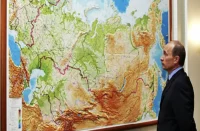Andrei Pravov (Russia)
A recent interview with the American political scientist Ariel Cohen produced a feeling more of déjà vu than anything else. We have seen these arguments before. In the early 1990s, Russian newspapers loved to publish the opinions of numerous Western politicians and political scientists about “how to reorganize the country.”
Interviews with both high- and low-ranking Americans often featured the idea that Moscow should pay more attention to advice from Washington in order to finally “start building a decent society.” We also got advice on how to act in the post-Soviet space, “where the Russians should abandon their colonial past once and for all.”
I must admit that at the time, almost 20 years ago, such ideas frequently found fertile soil in the attitudes of our fellow citizens. But there were those who doubted that our new American friends were being altruistic. They often said that all of the discussions about shared US and Russian interests in the world, including in the post-Soviet space, frequently seemed actually to almost be an overt call for Moscow to get on board with Washington’s interests.
It seems to me that things have changed a great deal since then.
Relations between the United States and Russia have also changed. Their mentoring tone has completely disappeared. We hear calls for cooperation and for the development of mutually beneficial relations, including in the post-Soviet space.
I completely agree with Cohen when he says the more Washington and Moscow talk about problems between our countries, the more quickly we will overcome them. But we can talk about problems in more ways than one.
For example, I don’t understand why Cohen said that Russia’s rapidly growing influence in Ukraine can give rise to a corresponding reaction that is less than friendly. Or why Georgia is a bone of geopolitical contention in Russian-American relations in the post-Soviet space.
Especially since Cohen quite sincerely and probably with the best of intentions warns that the issue will become more important now that the Republicans have returned to power, if only in Congress for now.
And he goes on to say—and this sounds like a teacher lecturing a lazy student— that we need to find a far-reaching, comprehensive solution to the problem. What was that? A warning? Watch out, or you’ll come to a bad end…?
I find myself imagining the reverse situation, where a Russian political analyst gives an interview to an American newspaper in which he sincerely and in a friendly voice advises Washington to refrain from further increasing its influence in neighboring Mexico. Or he casually mentions that Canada is a bone of contention in relations between our two countries. And ends by saying that we need to find a joint solution to our problems, which an American reader could only understand to mean one thing—a solution that benefits Moscow.
I cannot even imagine that happening. Georgia and Ukraine are Russia’s neighbors, just as Mexico and Canada are neighbors of the United States; and Moscow simply cannot be indifferent to the issue of increasing its influence on them. And it is not an attempt to return to the colonial past, as Washington sometimes tries to represent it. Incidentally, the Americans understand very well what is normal in geopolitics when they are talking about their own country’s interests, especially in neighboring countries. And not there alone.
For Russia, Ukraine and Georgia are not simply neighbors; they are countries with our brotherly peoples, and we shared a country for centuries.
Therefore, I cannot agree with the esteemed Mr. Cohen’s point of view that Moscow in its relations with Kiev and Tbilisi should pay attention to what Washington says. Or, in this case, to the possibility that Russian policy may produce a less than friendly reaction from the Republicans, who may be returning to the White House. These are precisely the considerations that Moscow should not be guided by.
I found another interesting aspect of the Cohen interview interesting, and I feel a need to discuss it in some detail. It concerns Afghanistan and specifically the idea that, according to Cohen, implementation of Russia’s recommendations for the wholesale eradication of drug crops could destabilize the country; and that if farmers’ source of livelihood—one we feel to be extremely immoral, of course—were to be taken away from them all at once, they would all take up arms against NATO and Afghan government forces.
In other words, Cohen believes the US and NATO counterterrorist coalition in Afghanistan should stay out of the fight against drug trafficking. But if we follow that logic, destruction of their opium and cannabis crops by Western military forces may not be the only thing that upsets Afghan farmers. The farmers might also get irritated when those forces carry out military operations, and they might find their presence in Afghanistan irritating in general. A favorite activity by many farmers in Afghanistan for decades has been to pick up their Kalashnikovs and go on the warpath. Does that mean the Western military should not try to prevent them from doing that either? It might irritate the locals.
Of course, the Afghan drug industry is a bigger headache for Moscow than for Washington. Packages of white powder from Kandahar, Khost and Jalalabad rarely reach America. In my opinion, that is why we increasingly hear statements that American soldiers should not risk their lives to destroy drug crops. However, it seems to me that in this context the cooperation that has been developing in recent months between Washington and Moscow over Afghanistan should not be ignored. But cooperation should be a two-way street. The Americans should also take our interests in Afghanistan into account, and not just rely on us for their most important transit route through Russian territory, both air and ground. After all, they may soon have no alternative to that route. The road from Pakistan through the Khyber Pass is getting more dangerous. Convoys with supplies for the counterterrorist coalition are increasingly subjected to large-scale attacks. Apparently, neither the Americans nor the Pakistani authorities are able to do anything about it. The same is true for the southern route—through Quetta to Kandahar.
And another thing. Even if the Americans’ very real dependence on transit through Russia to Afghanistan is ignored, the drug industry in that country may well cause huge problems, especially for the counterterrorist coalition itself. Its main enemy—the Taliban—derives enormous profits from it. What could the billions of dollars be used for? There are several possibilities. Some of them are quite fantastic. The Taliban might hire thousands of young computer geniuses to hack through all the sophisticated computer defenses of the offensive and defensive weapons systems the Americans have in Afghanistan. UAVs would start falling out of the air, and tanks and artillery would not hit their targets.
So to for the Americans to insist they should refrain from fighting Afghanistan’s drug industry is a very questionable point of view.
A number of other statements in Cohen’s interview are just as doubtful, in my opinion. And not just with respect to Georgia and Ukraine.
For example, he pointed out that the United States does not much like Moscow’s contacts with the “terrorist organization Hamas.” I feel, however, that the very fact that Moscow is cooperating with the largest group involved in the Israeli-Palestinian conflict demonstrates Russia’s determination to responsibly meet the objectives it accepted when it joined the Middle East Quartet, whose goal is to end the conflict. That recently became particularly obvious when negotiations between the Israelis and the Palestinians were almost completely deadlocked, and it was unclear how forcefully the peacekeepers would have to speak in the face of the deepening crisis. In my opinion, the fact that at least one member of the Quartet has a channel for negotiating with Hamas is very important.
So in that regard, Moscow will have to further upset Washington, as Mr. Cohen perceives it. However, Moscow is always willing to listen to different views on a wide range of issues.
But we should bear in mind that, as Russian president Dmitry Medvedev said a few days ago at the World Economic Forum in Davos, “Today, we are the way we are…We are learning and willing to receive friendly advice. What we don’t need is lecturing—we should be working together.”
Andrei Pravov is a political analyst and occasional staff reporter for the APN news agency in Israel, Afghanistan and Pakistan.
Source: New Eastern Outlook














I don’t know who Ariel Cohen is nor what he knows about anything. I see mention of him in some places, but he apparently has insufficient notice to gain an article on
Wiki. In any event, this is an interesting view of Russian/American relations, of which I hope for improvement. Off topic, but if I were to judge Ariel by the photo, I would say he looks like a pompous idiot.
I believe Obama wants to leave Afghanistan, drugs or no, before 2014.
This is just domestic politics. They will declare a win and walk off.
Bush picked a druglord, Karzai, from day #1. History will hardly judge him for his depth. His enmity toward Russia was demonstrated in 2008 in Georgia.
The best we can do is in post-conflict planning. Afghanistan is better managed from without than from within. I am sue we can do far better counter-narcotic work against these traffickers after the conflict ends. It would be best if they fought each other again for regions and markets, while assymetrical operations prevented product from Reaching Russia.